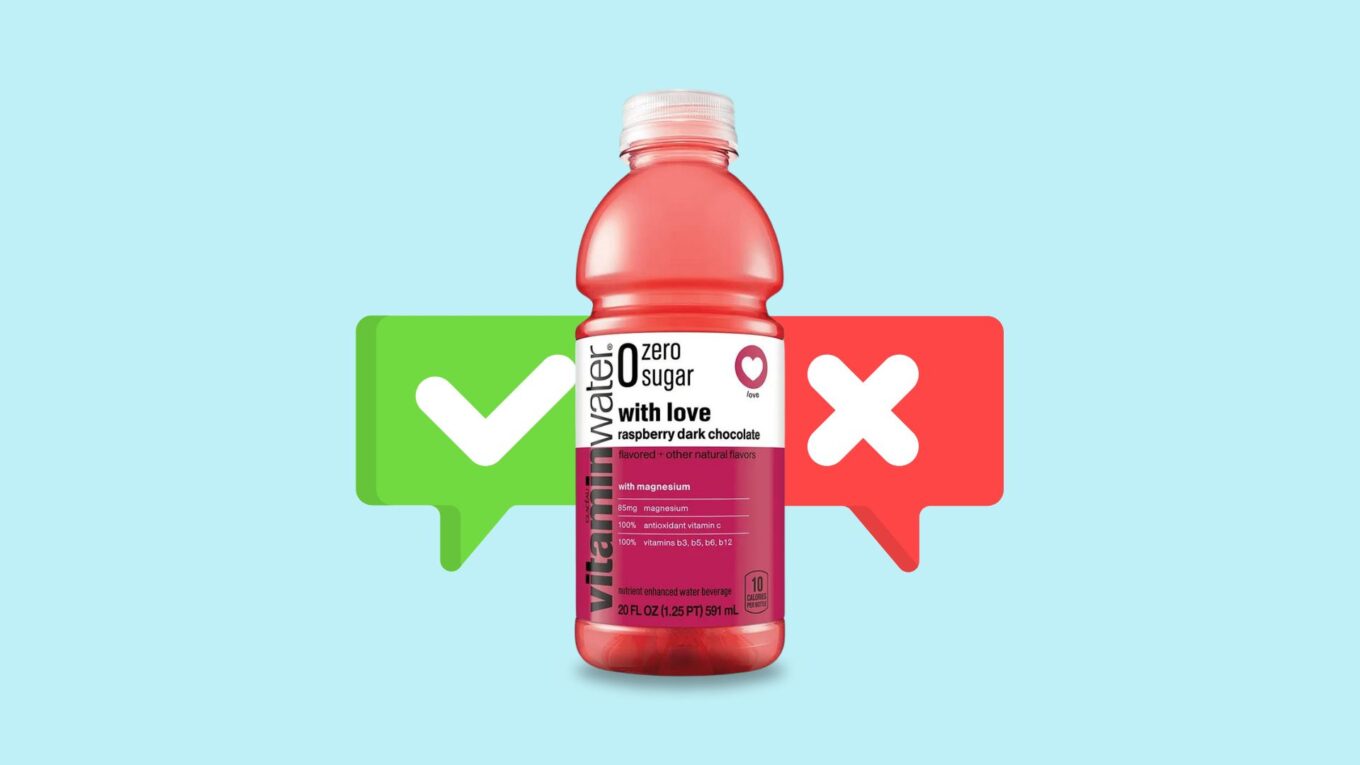Are you looking for a refreshing and healthy drink option? You might have heard about Vitamin Water Zero, a popular beverage that claims to be a better choice than sugary drinks.
But is it really good for you? While Vitamin Water Zero has some benefits, it’s important to understand the potential drawbacks.
In this article, we’ll explore the pros and cons of Vitamin Water Zero so you can decide whether it’s the right choice for your health goals.
We’ll cover the key ingredients, the potential health benefits, and the possible risks associated with this beverage.
By the end, you’ll clearly understand whether Vitamin Water Zero is a smart addition to your diet or if you should stick with plain water instead.
Benefits of Vitamin Water Zero
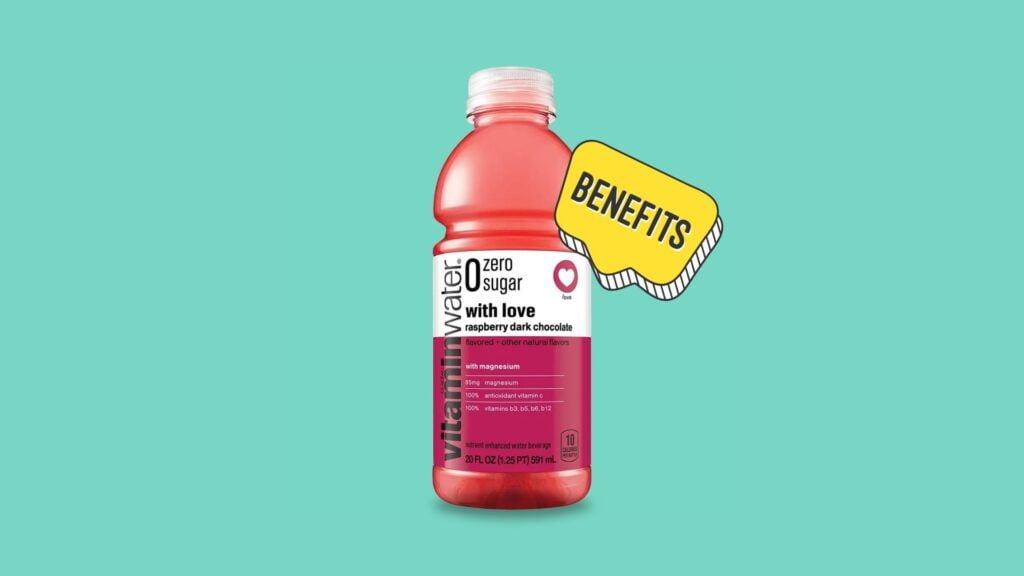
1. Nutritional Content
Vitamin Water Zero is a nutrient-rich beverage that provides essential vitamins and minerals to support overall health and well-being. It contains various key nutrients that play crucial roles in maintaining proper body function.
Each serving of Vitamin Water Zero offers a significant percentage of the daily value for vitamins B6, B12, and C.
Vitamin B6 aids in protein metabolism and red blood cell formation, while vitamin B12 supports neurological function and DNA synthesis.
Vitamin C is a powerful antioxidant that boosts immune health and promotes collagen production for healthy skin.
Compared to plain water and similar beverages, Vitamin Water Zero provides an enhanced nutrient profile without adding extra calories.
| Beverage | Calories per serving | Sugars (g) | Vitamin B6 | Vitamin B12 | Vitamin C | Artificial Sweeteners |
|---|---|---|---|---|---|---|
| Vitamin Water Zero | 0 | 0 | Yes | Yes | Yes | Stevia, Erythritol |
| Regular Soda | 150 | 39 | No | No | No | High-fructose corn syrup |
| Fruit Juices | 120 | 28 | No | No | Yes | None |
| Plain Water | 0 | 0 | No | No | No | None |
2. No Refined Sugars
Consuming refined sugars can lead to various health problems, such as obesity, type 2 diabetes, and heart disease.
Vitamin Water Zero uses plant-based sweeteners like stevia and erythritol instead of refined sugars.
Stevia is a natural, zero-calorie sweetener derived from the stevia plant leaves. It has a lower glycemic index than refined sugar, meaning it doesn’t cause rapid spikes in blood sugar levels.
Erythritol is another low-calorie sweetener that occurs naturally in some fruits and fermented foods.
By replacing refined sugars with these healthier alternatives, Vitamin Water Zero helps consumers manage their weight and reduce the risk of sugar-related health issues.
3. Low Calorie
Maintaining a low-calorie intake is crucial for overall health, particularly regarding weight management and preventing obesity-related diseases.
Vitamin Water Zero’s low-calorie content makes it an attractive option for those looking to manage their weight or maintain a healthy lifestyle.
By replacing high-calorie drinks with Vitamin Water Zero, individuals can reduce their daily calorie intake without sacrificing taste or hydration.
This makes it an appealing choice for many consumers, including those on calorie-restricted diets, people with diabetes, or anyone seeking a healthier beverage.
4. Taste and Variety
Vitamin Water Zero offers diverse flavor options, including strawberry, lemonade, and mixed berry, providing a refreshing alternative to plain water.
These flavors enhance the drink’s palatability, making people more likely to meet their daily hydration needs.
Studies have shown that the enhanced taste of flavored water can lead to increased fluid intake, especially among those who struggle to consume enough plain water throughout the day.
For instance, a study published in the Journal of the American Dietetic Association found that participants who consumed flavored water had a significantly higher total fluid intake than those who only drank plain water (Patel et al., 2012).
By offering an enjoyable taste experience, Vitamin Water Zero encourages regular hydration habits essential for maintaining overall health.
5. Healthier Beverage Choice
Sugary soft drinks and juices pose significant health risks, such as an increased likelihood of obesity, diabetes, and other metabolic disorders.
The World Health Organization (WHO) recommends reducing the intake of free sugars to less than 10% of total energy intake, with a further reduction to below 5% for additional health benefits (WHO, 2015).
Vitamin Water Zero emerges as a healthier alternative, supporting consumers’ health goals by providing a low-calorie, sugar-free option that still delivers essential nutrients.
As consumers become increasingly health-conscious, the demand for beverages that offer flavor and nutritional benefits continues growing. Vitamin Water Zero aligns with this trend, positioning itself as a convenient and tasty way to stay hydrated while avoiding the harmful effects of sugary drinks.
To incorporate Vitamin Water Zero into a healthy diet, consumers can enjoy it as a standalone beverage or pair it with nutrient-rich snacks like fresh fruits or vegetables.
By replacing sugary drinks with Vitamin Water Zero, individuals can achieve a healthier lifestyle without compromising taste or convenience.
Drawbacks of Vitamin Water Zero
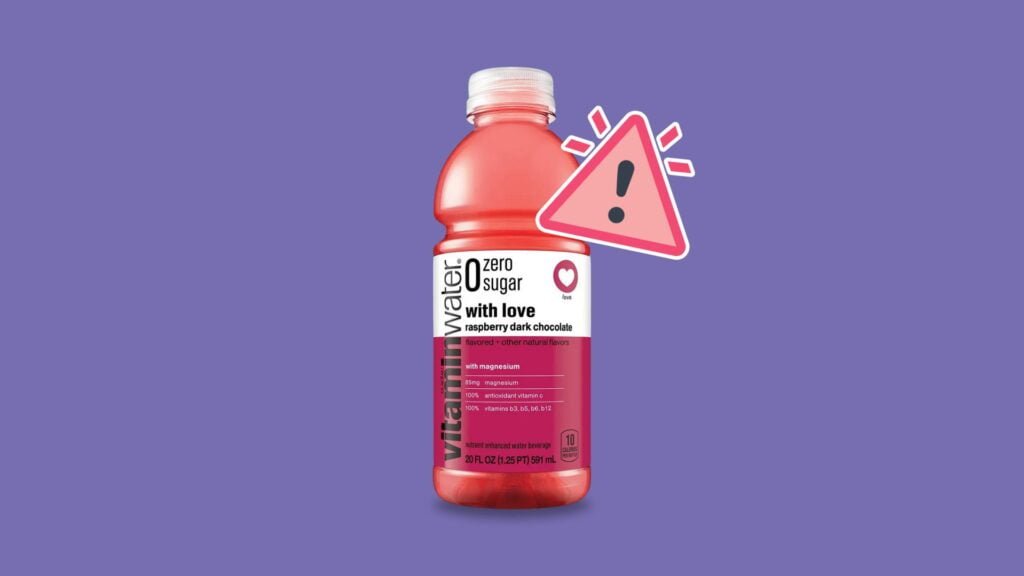
1. Potential for Weight Gain
While artificial sweeteners in Vitamin Water Zero are calorie-free, they may not necessarily support weight loss efforts and could lead to weight gain.
Some studies suggest that consuming artificial sweeteners may increase appetite and cravings for sweet foods, ultimately leading to overconsumption of calories (Swithers, 2013).
Research has shown that artificial sweeteners can disrupt the body’s natural ability to regulate calorie intake based on food sweetness.
This means that people who consume artificial sweeteners may eat more overall, leading to weight gain.
Additionally, some animal studies indicate that artificial sweeteners might alter gut bacteria in ways that promote obesity, although more human studies are needed to confirm this effect (Suez et al., 2014).
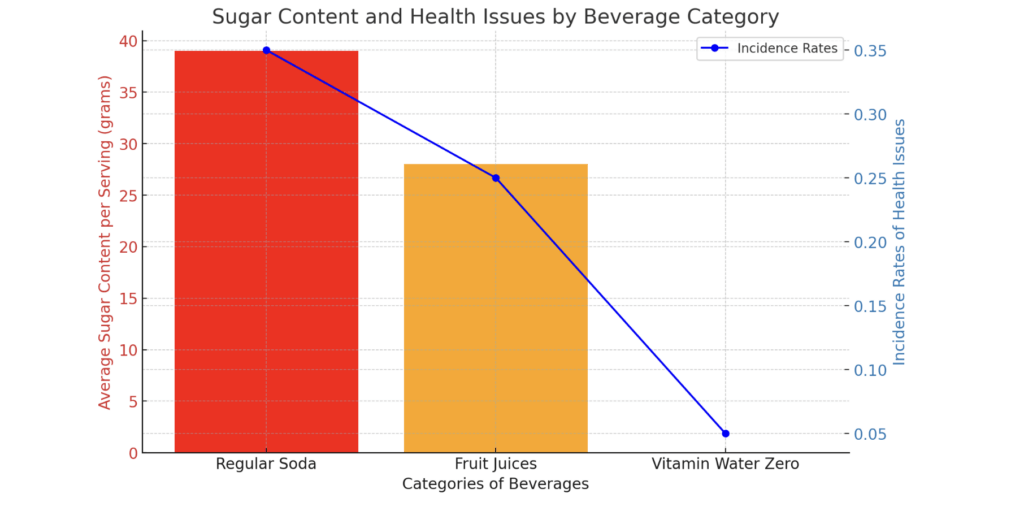
2. Excess Micronutrients
Consuming excessive amounts of certain micronutrients can be detrimental to health.
While Vitamin Water Zero provides essential vitamins and minerals, it’s important to be aware of the risks associated with overconsumption, especially fat-soluble vitamins like vitamins A and E, which can accumulate in the body and lead to toxicity.
To avoid these risks, it’s crucial to adhere to recommended daily intakes and not rely solely on supplemented beverages like Vitamin Water Zero for vitamin needs.
The Institute of Medicine (IOM) has established Tolerable Upper Intake Levels (ULs) for many nutrients, which represent the highest daily intake and are likely to pose no risk of adverse health effects (IOM, 2006).
Consumers should aim to obtain nutrients from a balanced diet that includes a variety of whole foods and only use supplemented beverages as a complement to, rather than a replacement for, a healthy diet.
3. Side Effects of Artificial Sweeteners
The artificial sweeteners used in Vitamin Water Zero, such as erythritol, can cause side effects in some individuals. Common side effects include gastrointestinal distress, bloating, and diarrhea, especially when consumed in large amounts.
It’s important to note that individual tolerance to these sweeteners can vary, with some experiencing more severe symptoms than others.
Those with sensitive digestive systems or pre-existing gastrointestinal issues may be more prone to experiencing adverse effects from consuming artificial sweeteners.
4. Contains GMOs
Vitamin Water Zero contains ingredients derived from genetically modified organisms (GMOs), which may raise concerns for some consumers.
GMOs are plants or animals genetically engineered to possess specific characteristics, such as resistance to herbicides or pests.
The safety of GMOs remains a topic of ongoing debate and research. Some studies suggest that GMOs may have negative health and environmental impacts, such as the potential for increased allergies, antibiotic resistance, and cross-contamination of non-GMO crops (Hilbeck et al., 2015).
However, proponents argue that GMOs are safe and can offer benefits like increased crop yields and reduced pesticide use.
As the long-term effects of GMOs are not yet fully understood, some consumers may prefer to avoid products containing these ingredients as a precautionary measure.
5. Deceptive Marketing
The marketing strategies employed by Vitamin Water Zero may overstate the product’s health benefits, potentially misleading consumers who are not well-versed in nutritional nuances.
While the beverage does contain essential vitamins and minerals, it is not a substitute for a balanced diet and should not be relied upon as a primary source of nutrition.
It’s crucial for consumers to educate themselves beyond marketing claims and seek information from unbiased sources to make informed dietary choices.
This includes understanding the product’s potential drawbacks, such as the presence of artificial sweeteners and GMOs, and considering how it fits into an overall healthy lifestyle.
By critically evaluating marketing claims and understanding the limitations of supplemented beverages like Vitamin Water Zero, consumers can make more informed decisions about their health and nutrition.
Is It Good for Your Health, Too?
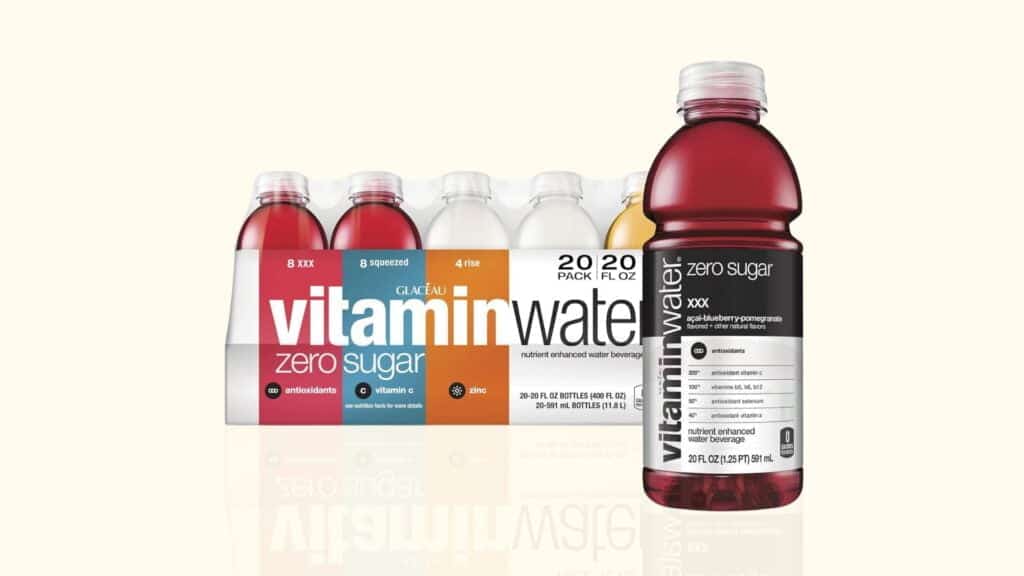
1. Comprehensive Analysis of Health Benefits and Risks
Vitamin Water Zero offers several health benefits, including essential vitamins, no refined sugars, and low-calorie content. These factors can support daily nutritional needs and contribute to maintaining a healthy lifestyle.
The beverage’s vitamins and minerals play crucial roles in various bodily functions. At the same time, the absence of refined sugars and low-calorie counts can aid in weight management and reduce the risk of sugar-related health problems.
However, it’s important to consider the potential risks that may counterbalance these benefits. The artificial sweeteners used in Vitamin Water Zero, such as erythritol, may lead to increased appetite and possible weight gain.
Additionally, consuming excess micronutrients from the beverage can be harmful, and GMO-derived ingredients raise concerns for some consumers.
2. Fit into a Balanced Diet
When judiciously incorporated, Vitamin Water Zero can fit into a balanced diet as a hydration option that occasionally replaces high-calorie, sugary drinks. It can serve as a tasty alternative to plain water, encouraging adequate fluid intake, which is essential for overall health.
However, it’s crucial to recognize the limitations of Vitamin Water Zero and not rely on it as the sole source of hydration or nutrition.
Registered dietitian Samantha Cassetty advises, “While Vitamin Water Zero can be a part of a healthy diet, it’s important to remember that it’s not a magic bullet.
Most of your fluid intake should come from plain water, and your diet should be rich in whole, unprocessed foods that naturally contain essential vitamins and minerals.”
3. Expert Opinions and Nutritional Advice
Nutritionists and health experts offer insights into Vitamin Water Zero’s consumption, highlighting its advantages and drawbacks. While they acknowledge the benefits of the added vitamins and minerals, they also caution against relying too heavily on the beverage to meet nutritional needs.
Dr. Lisa Young, a registered dietitian and adjunct professor of nutrition at New York University, notes, “Vitamin Water Zero can be a better choice than sugary drinks, but it’s not a substitute for a well-balanced diet.
The added vitamins and minerals are beneficial, but it’s always best to obtain these nutrients from whole food sources whenever possible.”
Experts advise consuming Vitamin Water Zero in moderation to avoid potential side effects from artificial sweeteners, such as gastrointestinal distress.
They also emphasize the importance of maintaining a varied diet to prevent excessive vitamin or mineral intake, which can lead to imbalances and potential health risks.
4. Evaluating Consumer Needs
When deciding whether Vitamin Water Zero is suitable, consumers need to consider their health goals and conditions.
For example, individuals with diabetes may need to be cautious about consuming beverages with artificial sweeteners, while those focused on weight management may find the low-calorie content appealing.
Making informed decisions about incorporating Vitamin Water Zero into one’s diet requires reading labels carefully, understanding the nutritional content, and evaluating how the beverage fits into personal dietary needs and restrictions.
By weighing the potential benefits against the risks and considering expert advice, consumers can determine whether Vitamin Water Zero aligns with their health goals and lifestyle.
Conclusion
Vitamin Water Zero presents a complex picture of health benefits and risks. While it boasts essential nutrients, low calories, and no refined sugars, the potential drawbacks of artificial sweeteners, excess micronutrients, and GMO ingredients cannot be ignored. Ultimately, whether Vitamin Water Zero is suitable depends on individual health goals and dietary needs.
For those looking to reduce sugary beverage intake, Vitamin Water Zero can be a step in the right direction, but it should be consumed in moderation as part of a balanced diet.
By understanding the pros and cons and making informed decisions, consumers can determine if Vitamin Water Zero aligns with their lifestyle.
As with any dietary choice, it’s essential to prioritize whole, unprocessed foods and listen to your body’s unique needs.

